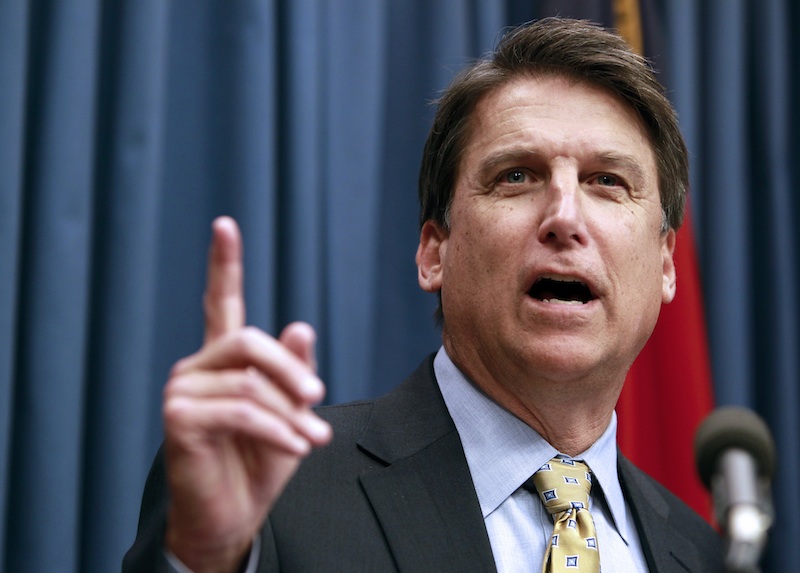North Carolina Gov. Pat McCrory (R) delivered an extensive defense of the state’s controversial new voter identification law on Monday.
After slamming the Department of Justice’s lawsuit against North Carolina as politically motivated and “without merit,” McCrory argued in a speech at The Heritage Foundation that the law actually helps to get “the politics out of early voting” and generally represses voter fraud and malpractice.
“But you know, we require a voter ID to get a tattoo, to get Sudafed, to get food stamps, to get on an airplane — to get almost any government service in North Carolina right now you have to have an ID,” McCrory said.
McCrory went on to note that the new law includes a provision that provides a “free ID” voter voters throughout the state.
“And our legislation is actually offering free IDs and the first election in which you have to have this ID in place is the 2016 election so people still have time to get an ID,” McCrory continued. “And by the way we still have early voting and voting by mail, which you can do early voting, which you don’t even need an ID on so someone can do it from a nursing home through the mail at this point in time. So I think our voting ID law by the national media and yes even by some of our local media in North Carolina has been greatly exaggerated and it’s commonsense reform which protects the integrity of our ballot box.”
“We have even more transparency in our voting rules where now we actually are prohibiting lobbyists from bundling money which you were allowed to do in the past to be the bundlers of money,” McCrory said. “And we have stricter rule for lobbyists,” pointing to a portion of the law that forbids lobbyists from collecting checks from one or more donors and delivering them to state-level candidates.
In essence, McCrory’s comments were a preview of the case North Carolina plans to make in defending the new law against the Justice Department lawsuit.
Awkwardly, the man charged with defending the state’s voter ID law has been publicly criticizing them. North Carolina Attorney General Roy Cooper (D), with ambitions of running for governor in 2016, has called the new requirements “unnecessary, expensive and burdensome.”
McCrory didn’t seem pleased with Cooper’s remarks, saying at the Heritage event on Monday, “He can have his personal opinion but as a lawyer he should not publicize your personal opinion if you’re going to be defending the people who are promoting this commonsense law.”
“Good lawyers don’t do that,” McCrory added.
But the arguments the governor laid out at the Heritage event don’t necessarily address what critics see as the primary problems with the law.
Critics say the specific types of identification required to vote, the reduction of the early voting period, the removal of same-day registration and elimination of early registration for 16- and 17-year-old voters who will be of 18 by Election Day won’t actually substantially reduce voter fraud. Rather, those changes will make it harder for younger minority voters — who tend to vote Democratic — from voting.
“The evidence is still out on the extent to which the constellation of North Carolina’s new provisions — not just voter ID, but also the end to same day registration, the end of counting provisional ballots cast in the wrong precinct, the cutback in the number of early voting days (though not the number of early voting hours, as the governor mentioned) — will cause a decline in turnout or skew turnout toward Republicans,” University of California at Irvine political science professor Rick Hasen told TPM in an email after McCrory’s comments. “In contrast, voter ID aims at stopping impersonation fraud, a kind of fraud which does not exist at any meaningful level.”
University of North Carolina constitutional law professor Gene Nichol told TPM that McCrory’s defense sounded more like “Republican talking points” and may not be what the state actually argues against the Justice Department’s challenge. “I’m assuming their defense, actually, will be ‘we’re doing all this for political reasons, not racial ones.’ But they don’t want to quickly say ‘we’re all about partisan advantage.'”
The Justice Department’s goal with its lawsuit is to prove that the purpose of the new law is intentional racial discrimination. That’s a difficult case to make, even with the data indicating that the restrictions of the new provisions hit minority Democratic voters hardest.
“Our voter ID provision [only a small part of this blunderbuss statute] requires, essentially, a North Carolina driver’s license, passport or military ID,” Nichol continued. “The data folks say hundreds of thousands of voters in NC do not have such IDs. They are disproportionately people of color, students and seniors. Huge numbers of voters will be burdened, disproportionately non-Republican, with no ascertainable state justification. They can neither locate or describe any fraud problem they seek to rectify. Also, students IDs were intentionally rejected — both state university IDs and private ones. Students vote disproportionately Democratic, so their IDs don’t count. They also ended the program to encourage 17 year olds to register and participate when they become eligible. Apparently, 18 year olds vote the wrong way too.”






